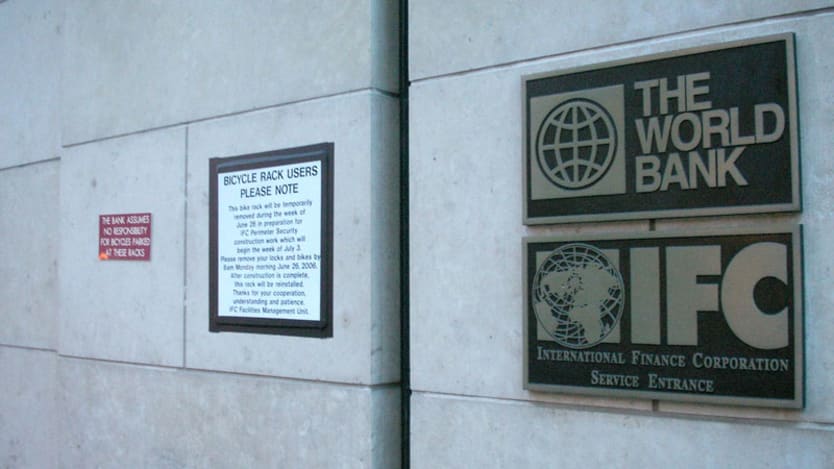
WASHINGTON — The International Finance Corporation, which recently received a $5.5 billion vote of confidence from its shareholders, now faces scrutiny and growing pressure from all sides as it vows to improve its accountability.
The private sector arm of the World Bank was a surprise winner during last year’s capital increase negotiations, securing $5.5 billion as part of the $13 billion refinancing package. But the deal came with tough conditions, including that IFC dedicate 40% of its portfolio to investing in the world’s most disadvantaged countries, particularly fragile and conflict-affected states.
Doing deals in fragile and conflict-affected states is difficult and risky, and has led to increased calls from shareholders, notably the United States, for the bank to strengthen its approach to accountability. In 2017, the bank’s board initiated a review of the World Bank’s Inspection Panel, its main accountability tool, and plans are now underway to overhaul the IFC’s watchdog, the Office of the Compliance Advisor and Ombudsman, or CAO.
But IFC accountability is no longer just a concern for the board. The U.S. Supreme Court weighed in after a group of Indian farmers brought a case against the development finance institution, claiming that an IFC-backed coal project damaged their health and livelihoods. Last month, the court ruled that IFC is not immune from such lawsuits, putting IFC accountability systems in the spotlight.
More from the World Bank Spring Meetings
► World Bank looking for new options in fragile and conflict states
► World Bank reforms found ineffective, bank shuffles senior staff
► New report casts doubt on World Bank 'billions to trillions' agenda
Then on Tuesday, as the World Bank’s Spring Meetings got underway, U.S. lawmaker Maxine Waters, chair of the House Financial Services Committee, expressed concerns about IFC’s approach to subsidizing private investment in low-income countries.
But while the Supreme Court decision has put a spotlight on IFC accountability, civil society groups have long raised concerns about IFC projects causing harm. The development finance institution’s support for private education projects, which critics say are having negative impacts on children and teachers, is also under renewed attack in a report published by Oxfam earlier in the week. Meanwhile, another new report accused IFC of “quietly bankrolling” coal mining projects in Indonesia with disastrous consequences for local communities.
Against this backdrop of heightened scrutiny, IFC boss Philippe Le Houérou announced sweeping accountability reforms on Wednesday. Le Houérou said IFC would become more proactive in preventing and responding to complaints from communities. The changes will “require more dedicated IFC resources” and also a “change in our behavior and culture,” Le Houérou wrote. The CEO expanded on the plan in an interview on Thursday.
“It remains unclear how these commitments will directly resolve outstanding issues of non-compliance and harm from existing CAO cases.”
— Kindra Mohr, policy director, Accountability CounselIncreased scrutiny welcomed
CAO has welcomed IFC’s enhanced accountability efforts, especially if it means fewer cases coming to the ombudsman, Osvaldo L. Gratacós, who heads up CAO, told Devex in an email.
“CAO supports any initiative that promotes the opportunity for environmental and social issues to be addressed early and proactively, whether in the context of a CAO process or not,” he wrote.
Gratacós also said he hoped the “forthcoming review further strengthens the accountability framework of IFC and MIGA, including how communities benefit from projects, and ensuring CAO both contributes to IFC’s development goals while providing an independent avenue for community concerns.”
Civil society groups were also broadly supportive but said affected communities also need access to remedy.
“These are positive, forward-looking commitments to advancing institutional accountability and bringing redress to communities that have endured the negative impacts of IFC investments,” Kindra Mohr, policy director at the Accountability Counsel, an NGO that advocates for people who say they were harmed by internationally financed projects, said in a statement. “However, it remains unclear how these commitments will directly resolve outstanding issues of non-compliance and harm from existing CAO cases,” she added.
Opinion: At IFC, accountability is of utmost importance
International Finance Corporation CEO Philippe Le Houérou ushers in a new era of accountability at IFC — one that "will require more dedicated IFC resources" and "a change in our behavior and culture."
Vivek Maru, CEO at grassroots legal empowerment NGO Namati, and a former senior counsel at the World Bank, told Devex in an email: “If we're serious about accountability, we need to ensure that people harmed by the IFC's investments have access not just to an advisory body, but to a remedy.” This means making social and environmental standards enforceable, and access to a mechanism with the authority to issue binding decisions if local institutions fail, he explained.
CAO review
The World Bank’s board of directors will soon begin an official review of CAO, and broader accountability issues facing IFC and MIGA.
The forthcoming review has been in the works for a while and will be led by a panel of experts who are still being selected, according to Jürgen Zattler, executive director for Germany at the bank, and chair of the board’s committee on development effectiveness. Issues likely to come up include whether CAO should continue to report to the president of the World Bank or come under the board.
“My hope would be that the CAO would report directly to the board, as this would be in line with the board’s overall role,” Koen Davidse, the bank’s executive director representing the Netherlands constituency, and who also sits on the board committee, told Devex.
As part of the review, the board will also look at how IFC management responds to CAO findings, Zattler said.
“If CAO comes up with specific findings then the question is how directly and quickly will that be taken up by the IFC management. We want to have a smooth, efficient cooperation between CAO, management and the board,” Zattler told Devex, adding that “a responsive system, in which the CAO comes out with a finding which is swiftly followed up [by IFC], is good for communities.”
Zattler also said that maintaining transparency was important, responding to fears expressed by some civil society groups that IFC could become “bunkerized” due to perceived fears of litigation thanks to the U.S. Supreme Court decision.
“The board wants IFC to have an efficient [and] transparent system. It’s not about holding back information. The best way to deal with reputational risk and with accountability problems is to be very transparent,” the executive director said.
However, while the bank’s board and IFC have clearly prioritized accountability, it is not yet clear what position the bank’s new president, David Malpass, will take. Considering he previously sat in the U.S. Treasury Department — which has been pushing for stronger accountability mechanisms — Malpass could continue that agenda.
But now that he is inside the institution, he may choose to take a softer approach, closer to that of his predecessor, Jim Kim. Although a vocal supporter of accountability, Kim did little to engage with specific CAO cases, one bank insider told Devex.








